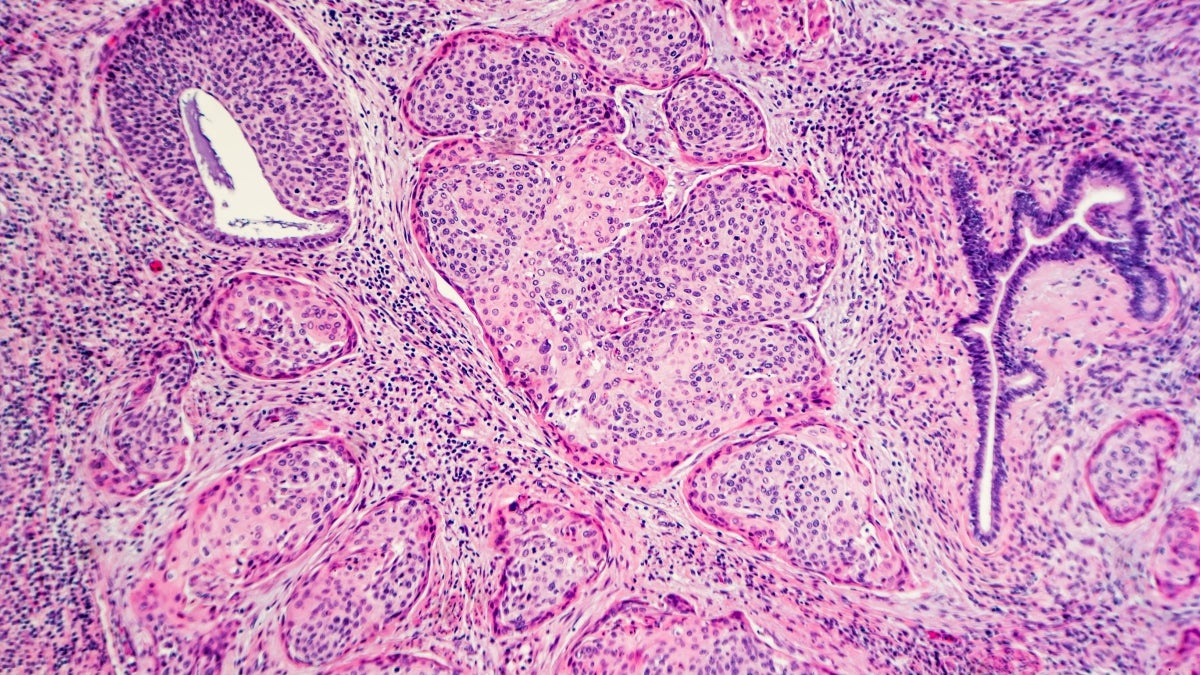Viral transformations in the female genital tract can spell trouble for women’s health

Cervical Cancer: Invasive squamous carcinoma arising in association with severe squamous dysplasia related to HPV (human papilloma virus). HPV vaccination in teens can be preventive. Image by David A Litman/Shutterstock
The human papillomavirus (HPV) is a known risk factor for cervical cancer. Researchers at Arizona State University are hoping to better understand the factors leading to persistent HPV infection and the progression to cancer by studying the complex communities of microbes in the female reproductive tract, known as the vaginal microbiome.
In a new study, Efrem Lim and his colleagues examine an often-overlooked subset of the vaginal microbiome — the viruses. Lim is a researcher with the ASU Biodesign Center for Fundamental and Applied Microbiomics and an assistant professor at the School of Life Sciences.
The research demonstrates that crucial changes in the vast community of viruses, or virome, may enable persistent HPV infection and progression to cancer. The viral alterations appear to be associated with changes in bacterial composition and genital inflammation.
“Microbes maintain a delicate balance in our body to promote health,” Lim says. “Viruses can tip the scale towards a worse health outcome.”
The research appears in the current issue of the journal mSystems.
Efrem Lim
Cervical cancer is one of the most common cancers among women. In 2020, more than 600,000 cases and 340,000 deaths were reported worldwide. In addition to infection with the HPV virus, known risk factors for cervical cancer include immunodeficiency, smoking and oral contraceptive use.
Recent studies have explored the relationship of the vaginal microbiome to cervical cancer, though the viral component has often been neglected. Viruses interact with both human cells and the vast profusion of bacteria present in the genital tract. The new study uses next-generation gene sequencing to get a clearer read on the community of viruses present in vaginal microbiome samples from women in the Phoenix metropolitan area.
The results highlight an association between genital inflammation and low abundance of the bacterial species lactobacillus with reduction in virome diversity. Lactobacillus bacteria are known to be important mediators of genital health. Further, conditions conducive to persistent HPV infection were also associated with the abundance of a group of viruses that infect bacteria — known as bacteriophages. The findings further emphasize the importance of studies of the virome and its complex interactions with other constituents of the human microbiome.
More Science and technology

ASU professor breeds new tomato variety, the 'Desert Dew'
In an era defined by climate volatility and resource scarcity, researchers are developing crops that can survive — and thrive —…

Science meets play: ASU researcher makes developmental science hands-on for families
On a Friday morning at the Edna Vihel Arts Center in Tempe, toddlers dip paint brushes into bright colors, decorating paper…

ASU water polo player defends the goal — and our data
Marie Rudasics is the last line of defense.Six players advance across the pool with a single objective in mind: making sure that…


